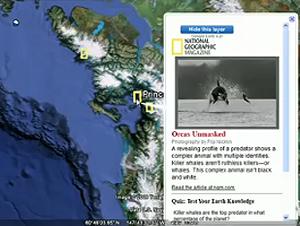Google mapping goes underwater
A popular example of consumer technology is Google Earth. The software has been downloaded more than 500 million times since its launch in 2005. But Google Earth was missing something — the three-quarters of the Earth's surface that is covered in water. So now, we have Google Ocean. Users can plunge beneath the ocean’s surface; explore 3-D images of the underwater terrain, and view articles and videos about marine science.
"The World's" Marco Werman talks to Carl Safina, a professor at the School of Marine and Atmospheric Sciences at Stonybrook University in New York.
On the importance of Google Ocean, Safina says: "Well, it's important for the same reason that maps of the land are important: we need to know where we live. For most people, the ocean is a big blank, blue space. For other people, it's a big bathtub full of water. And you know, the mapping helps people to understand that what it actually is is a mosaic of lots of different kinds of habitats, different kinds of spaces, and, you know, it just gives people more a sense of the reality of the home planet that we live on."
As for some of the urgent issues facing the world's oceans and whether the mapping in Google Ocean does anything to address those concerns: "Well, the top issues are the same as they are on land, really. They are overpopulation, the need for a clean and renewable energy economy instead of one that is dirty and one that is heating up the world and changing the chemistry of the ocean. So the ocean needs us to change our behavior. The map will be of assistance, but it's not a solution."
Google Ocean could potentially do more harm than good — it can be a tool that fisherman, mining companies or coastal developers can use to more efficiently exploit the world's seas; but Safina doesn't think so: "I think the bad people are always three steps ahead of us. You know, people who fish in the ocean have had satellite images of sea surface temperature faxed onto their boats for years, so that they know in the trackless vastness, they know exactly where to go. They don't need Google Earth to tell them where to go fishing. And the same thing is true of mining interests – they know where it is. But one thing that I'm hoping is just like the wild west was a place where a few bad apples could go to escape the rule of law, and they got crowded out of existence when lots more people moved in, maybe the exploiters will stop having the ocean all to themselves, and maybe the exploitation will get a little bit more crowded out."
In the 60s and 70s, the heroism of the Apollo space mission elevated peoples' fascination with outer space. According to Safina, thinks the seas need something beyond an "Apollo moment": "I think what the seas need is something more permanent. And just as a conservationist named Aldo Leopold — who wrote a great classic book called "A Sand County Almanac" that was published around 1940 — was the first person to combine biology and our knowledge of the ecology of the land with a sense of ethical responsibility and an idea that the human community includes not just people, but the entire living landscape in which people become possible– I think that we need to extend this to the seascape as well. And I hope one day it will all just become the ethic of life and how human beings understand who and what we are and therefore what we need to do."
PRI's "The World" is a one-hour, weekday radio news magazine offering a mix of news, features, interviews, and music from around the globe. "The World" is a co-production of the BBC World Service, PRI and WGBH Boston.
